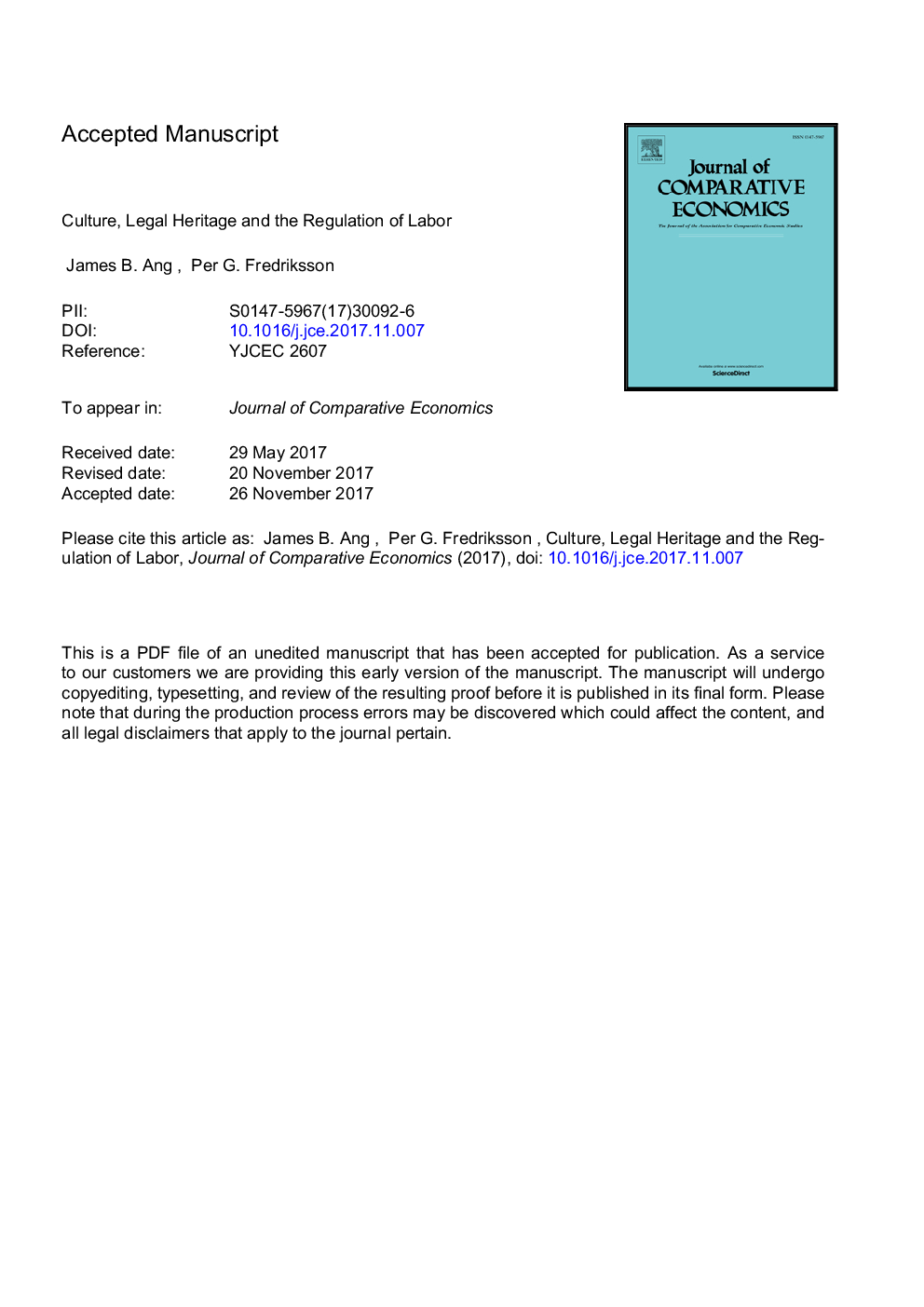| کد مقاله | کد نشریه | سال انتشار | مقاله انگلیسی | نسخه تمام متن |
|---|---|---|---|---|
| 7356867 | 1478411 | 2018 | 38 صفحه PDF | دانلود رایگان |
عنوان انگلیسی مقاله ISI
Culture, legal heritage and the regulation of labor
ترجمه فارسی عنوان
فرهنگ، میراث حقوقی و تنظیم کار
دانلود مقاله + سفارش ترجمه
دانلود مقاله ISI انگلیسی
رایگان برای ایرانیان
کلمات کلیدی
ترجمه چکیده
بر طبق روانشناسان متقابل فرهنگی، تفاوت های متقابل کشور در فردگرائی در مقابل کالکت گرایی، ابعاد مهم تنوع فرهنگی را تشکیل می دهند. نظریه پردازان حقوقی و اقتصادی استدلال می کنند که فلسفه های حقوقی نظیر قانون مشترک و قانون مدنی بیش از قرن ها متفاوت بوده و اثرات ماندگار دارند. در این مقاله، ما استدلال می کنیم که اثرات فرهنگ و نهادها نباید جدا از یکدیگر بررسی شوند؛ زیرا این تعاملات آنها را نادیده می گیرد. ما دو ادله جداگانه را در مورد ویژگی های فرهنگی و نظریه های قانونی قانونی ادغام می کنیم و یک فرضیه در مورد اثرات مشترک آنها را در مقررات بازار کار به دست می آوریم. ما فرض می کنیم که اثر فردگرائی بر عزم سیاسی مقررات کار باید در نظام های اقتصادی بیشتر بازار (به عنوان کشورهای قانون مشترک بریتانیا) در مقایسه با سیستم های محکم تر و بوروکراتیک تر (به عنوان در کشورهای قانون مدنی فرانسه ) اقتصادهای مبتنی بر بازار به تلاش فردی و توانایی اتاق های بیشتری برای شکوفایی می پردازند که در فرهنگ های فردی مقررات کار ضعیف تر را به وجود می آورد. اثر فردگرایی در سیستم های مرکز دولتی باید کوچکتر باشد. با استفاده از داده های مربوط به میانگین سختی مقررات کار در سال های 1950 و 2004 در 86 کشور، متوجه می شویم که اثر منفی فردگرائی بر رعایت مقررات کار با حضور یک نظام قانونی قانونی مشترک، افزایش می یابد. در واقع، فردگرایی بر سفتی قوانین بازار کار در کشورهای مدنی اثری ندارد. به همین ترتیب، اثر منفی قانون قانونی قانون مشترک در مقررات بازار کار مطابق با سطح فردی بودن است. فردگرایی و نظام های حقوقی قانونی مشترک در تعیین مقررات کار، تکمیل می شوند.
موضوعات مرتبط
علوم انسانی و اجتماعی
اقتصاد، اقتصادسنجی و امور مالی
اقتصاد و اقتصادسنجی
چکیده انگلیسی
According to cross-cultural psychologists, cross-country differences in individualism vs. collectivism constitute an important dimension of cultural variation. Legal-economic theorists argue that legal philosophies such as common law and civil law have developed differently over centuries and have persistent effects. In this paper, we argue that the effects of culture and institutions should not be analyzed in isolation from each other, as this disregards their interactions. We merge the two separate literatures on cultural attributes and legal origin theories, and derive a hypothesis regarding their joint effects on labor market regulations. We hypothesize that the effect of individualism on the political determination of labor regulations should be particularly pronounced in more market-oriented economic systems (as in British common law countries) compared to more rigid and bureaucratic state-centered systems (as in French civil law countries). Market oriented economies give individual effort and ability greater room to flourish, which in individualistic cultures yields weaker labor regulations. The effect of individualism should be smaller in state centered systems. Using data on the average rigidity of labor regulations during the years 1950-2004 in 86 countries, we find that the negative effect of individualism on the rigidity of labor regulations is enhanced by the presence of a common law legal system. In fact, individualism has no effect on the rigidity of labor market regulations in civil law countries. Analogously, the negative effect of common law legal origin on labor market regulations is found to be conditional on the level of individualism. Individualism and common law legal systems are complements in the determination of labor regulations.
ناشر
Database: Elsevier - ScienceDirect (ساینس دایرکت)
Journal: Journal of Comparative Economics - Volume 46, Issue 2, June 2018, Pages 616-633
Journal: Journal of Comparative Economics - Volume 46, Issue 2, June 2018, Pages 616-633
نویسندگان
James B. Ang, Per G. Fredriksson,
